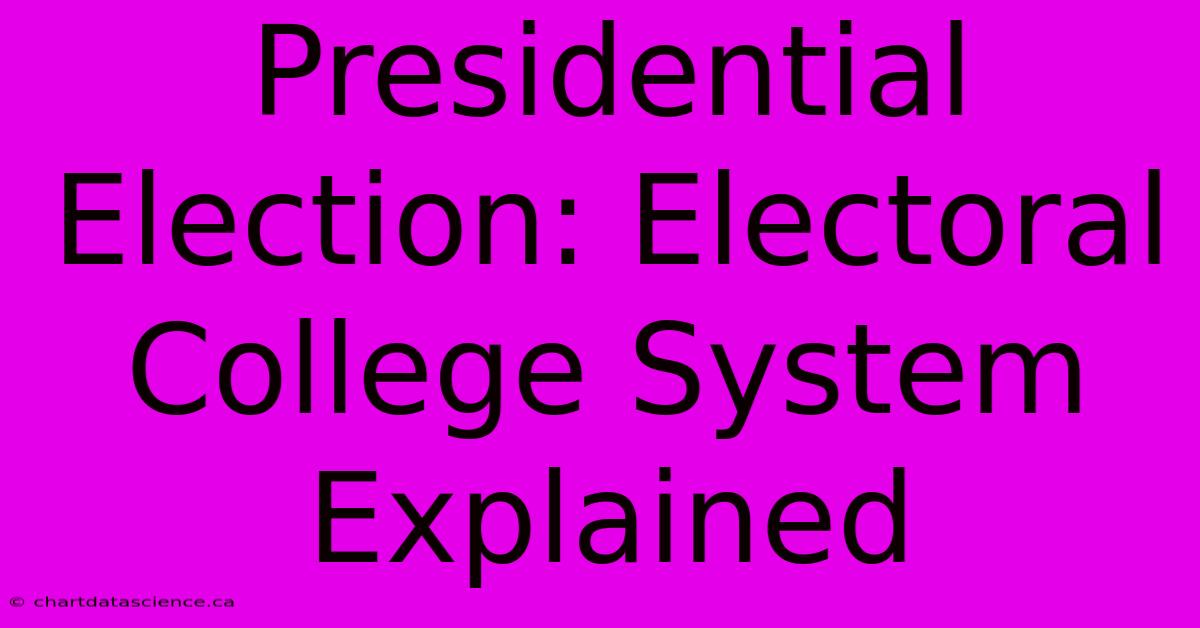Presidential Election: Electoral College System Explained

Discover more detailed and exciting information on our website. Click the link below to start your adventure: Visit My Website. Don't miss out!
Table of Contents
The Electoral College: Why America's President Isn't Decided By Popular Vote
It's the biggest political event in the US, but how does the Electoral College actually work? It's a system that gets a lot of people talking, especially after close elections. Some people love it, others hate it, but everyone wants to know how it works.
Let's break it down.
The Electoral College: A System of Representatives
The Electoral College is a group of electors established by the Constitution, representing each state. It's not about the total number of votes a candidate receives, but rather, the number of electors they win in each state. The number of electors each state has is determined by its population, with larger states having more electors.
For example, California has 55 electoral votes while Wyoming has only 3. This means the winner in California could technically win more than 18 times the electoral votes than the winner of Wyoming.
How It Works: Winning States, Not Votes
Every four years, Americans vote in a general election for president. Each state's election is a winner-take-all system – the candidate who wins the popular vote in a state wins all of that state's electoral votes. It's like a sports tournament where you need to win the entire game, not just get more points than your opponent.
Think about it this way: You could win a game of basketball by 1 point, but you still win the whole game, right? The Electoral College is kinda like that.
Reaching the Magic Number: 270
The candidate that reaches 270 electoral votes first wins the presidency. This is half of the total electoral votes (538) plus one. Even if a candidate wins the popular vote across the country, they can still lose if they don't secure the necessary 270 electoral votes.
Controversy and Debate
The Electoral College has been a source of controversy for a long time. Some people argue it's undemocratic and unfair because a candidate can win the presidency without winning the popular vote. They say it gives too much power to smaller states and ignores the will of the people.
Others argue it's important for maintaining the balance of power between states and preventing a single, large state from dominating the election. They say it forces candidates to focus on appealing to a wider range of voters across the country, not just in heavily populated areas.
The Future of the Electoral College?
The debate over the Electoral College is likely to continue. It's a system that's been around for centuries, but its relevance is constantly being questioned. Ultimately, the decision of whether or not to change the system is up to Congress.
So there you have it! The Electoral College is a complex system with a long history. It's a system that's both praised and criticized, but it remains the way we choose our President.

Thank you for visiting our website wich cover about Presidential Election: Electoral College System Explained . We hope the information provided has been useful to you. Feel free to contact us if you have any questions or need further assistance. See you next time and dont miss to bookmark.
Also read the following articles
| Article Title | Date |
|---|---|
| Loughborough Fair Coming Soon | Nov 06, 2024 |
| Bitcoin Price Forecast Trump Win Boosts | Nov 06, 2024 |
| What Is Project 2025 Trumps Response | Nov 06, 2024 |
| Live Sporting Vs Man City Champions League Score | Nov 06, 2024 |
| Jill Stein Green Party Candidate Explained | Nov 06, 2024 |
